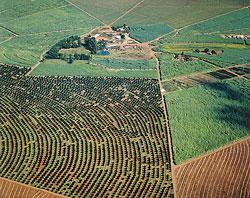A brief introduction to the cultivation of Yemeni boutique coffee beans with unique flavor, geographical location, climate and altitude

Yemen Coffee Market:
Yemeni coffee is exported from December to April. There has been a problem in the past with coffee from the north being adulterated with inferior substances before it is shipped from the southern port of Aden. Only coffee shipped from the port of Hodeida can be identified as truly originating in the north. The vast majority of coffee in Yemen is grown under natural conditions, mainly due to the lack of funds for growers.
The origin of these trees is Ethiopia. Yemen was the first country in the world to produce coffee on a large scale as an agricultural crop. Yemeni coffee farmers still produce coffee the same way they did 500 years ago. Coffee berries grow naturally on trees, without the use of artificial fertilizers or pesticides, and in summer they are moistened by a small amount of rain and fog on the slopes, and in dry winter, mature coffee berries are allowed to hang on trees and dry naturally-a very unique and rare practice, thanks to the extremely dry climate and scorching sun in Arabia, which may cause coffee berries to rot on trees in other coffee producing areas.
Coffee from Yemen:
Yemen produces Peaberrybeans: Smaller and rounder than most coffee beans, they look like peas and are sometimes referred to as mocha beans. Mocha coffee beans are similar in appearance to Ethiopian Harrar coffee beans, which are small in size, high in acidity and mixed with a strange and indescribable spicy flavor. Careful tasting can also discern a hint of chocolate, so attempts to add chocolate to coffee are a natural progression.
In Yemen, coffee growers plant poplars to provide shade for coffee trees. As in the past, the trees were planted on steep terraces to maximize use of less rainfall and limited land resources. In addition to tipika and bourbon coffee trees, more than a dozen different coffee species originating in Ethiopia are cultivated in Yemen. Authentic mocha coffee is produced only in Yemen, southwest of the Arabian Peninsula, on steep mountain sides at altitudes of 3,000 to 8,000 feet, and is the oldest coffee in the world.
Mokha Mattari: A coffee market name from Bani Mattar(also spelled Bany Mattar) in Yemen's western capital Sanaa. Coffee grown at high altitudes, usually with good red wine aromas, dry fruit flavors, a thick taste, and a bitter chocolate sweetness when roasted deeply. Good quality martali beans are small in shape, raw beans have a sweet wine aroma and moderate ripe fruit fermentation flavor. Always the winner because of the more obvious Yemeni style.
Mokha San 'ani: A widespread market name for coffee from some growing areas west of Yemen's capital, Sanaa. A blend of beans from tens of thousands of small farms on hillsides near the capital, San a (left). It is planted at a lower elevation than Martali, and generally tastes thinner and less acidic than Martali, but has a good fruity flavor, often with better ripe fruit and wild flavors than Martali. According to my experience, in recent years, there has been a great difference in the quality of Sanani, sometimes with flat flavor, earthy smell, fermented taste of inferior goods, careful cup test selection is a coffee merchant must do their homework, absolutely can not be lazy.
Although Yemeni coffee is of good quality and creamy aroma, it has its drawbacks: quality is not always guaranteed and the classification of beans is uncertain. Traditionally, Yemen's best coffee beans come from Mattari, followed by Sharki and then Sanani. These beans are low in caffeine. Deep-roasted Yemeni coffee often exhibits a bitter, sweet flavor similar to chocolate, affecting today's fancy coffee flavored with chocolate sauce is also known as "mocha". Yemeni coffee has some of the most unique, rich, and mesmerizing complex smells in the world: red wine, wild, dried fruit, blueberry, grape, cinnamon, tobacco, sweet spice, log, and even chocolate, and you can see all kinds of adjectives used for Yemeni mocha. Just as mocha has many different meanings, mocha has different spellings in English: Moka, Moca, and Mocca are all common spellings, and there are as many as four local spellings on Yemeni coffee sacks and documents: "Mokha,""Makha,""Morkha," and "Mukha," all of which mean the same thing.
Mokha Ismaili: is one of the traditional ancient tree species, the market name for a famous coffee from central Yemen, and is also described as a botanical classification of traditional Yemeni coffee with high beverage quality. Growing at high altitudes, above 6500 feet, the beans are characterized by rounder shapes, smaller bean shapes, thick texture, and high complexity, often exceeding those of Madali. This is the least produced and most expensive Yemeni mocha (Yemeni mocha is already not cheap). Mocha ismaili of excellent quality is produced in Hirazi district (although famous as Bani Matar, it is the best known growing area in Yemen). The mountain side of Hirazi district has a maximum altitude of 8000 feet!
Mokha Rimi: Djebel Remi(also known as Raimi, Rayma) region, similar in quality to Shanani, Mokha Rimi is usually slightly fermented, occasionally surprisingly rich in raisin sweetness, properly roasted, coffee beans smell like opening a bottle of rich jam.
Mokha Yafeh: produced in Yafeh(also known as Yaffe) province in southern Yemen, belongs to the rare Yemen mocha, is Yemen's only "southern taste", the output is not much, almost all sold to the neighboring United Arab Emirates, in the international boutique coffee market has been rarely seen.
A coffee of single origin from the mountains of Yemen bordering the Red Sea at the southwestern tip of the Arabian Peninsula. The best cultivated coffee in the world, known for its high viscosity and exceptional rich wine acidity.
Yemeni mocha has different genres depending on the region, just like MATTARI mocha chocolate and sour, SANANI mocha rough and fragrant.
Features of Yemeni Coffee:
Yemeni mocha has a variety of flavors, and it is a challenge for coffee roasters to roast the best flavor of Yemeni mocha! Light medium roast shows sweet fruit, mild, warm sun fermentation flavor; deep roast shows rich red wine flavor, bitter sweet chocolate aftertaste.
Flavor: Exotic, slightly aromatic, spicy, distinctive, not to be missed
Recommended baking method: medium baking
★★★: Excellent
Important Notice :
前街咖啡 FrontStreet Coffee has moved to new addredd:
FrontStreet Coffee Address: 315,Donghua East Road,GuangZhou
Tel:020 38364473
- Prev

A brief introduction to the planting market price of Yemeni boutique coffee bean varieties with endless aftertaste
Yemeni coffee origin: Yemeni bean-shaped berry coffee beans (Peaberrybean): this coffee bean is smaller and rounder than most coffee beans and looks like peas, sometimes called mocha coffee beans. The shape of mocha coffee beans is similar to that of Ethiopia's Harrar coffee beans.
- Next

A brief introduction to the treatment method of grinding degree and baking degree of Yemeni high-quality coffee beans with complete grain shape
The characteristics of Yemeni coffee: the taste of Yemeni mocha is complex and changeable, and how to bake the best flavor of Yemeni mocha is a challenge for coffee roasters. Medium and shallow roasting shows sweet fruit, mild, warm sun-fermented flavor; deep baking shows a strong aroma of red wine, bitter sweet chocolate finish. Flavor: exotic, slightly alcoholic, spicy and exciting, different, must be tasted
Related
- Detailed explanation of Jadeite planting Land in Panamanian Jadeite Manor introduction to the grading system of Jadeite competitive bidding, Red bid, Green bid and Rose Summer
- Story of Coffee planting in Brenka region of Costa Rica Stonehenge Manor anaerobic heavy honey treatment of flavor mouth
- What's on the barrel of Blue Mountain Coffee beans?
- Can American coffee also pull flowers? How to use hot American style to pull out a good-looking pattern?
- Can you make a cold extract with coffee beans? What is the right proportion for cold-extracted coffee formula?
- Indonesian PWN Gold Mandrine Coffee Origin Features Flavor How to Chong? Mandolin coffee is American.
- A brief introduction to the flavor characteristics of Brazilian yellow bourbon coffee beans
- What is the effect of different water quality on the flavor of cold-extracted coffee? What kind of water is best for brewing coffee?
- Why do you think of Rose Summer whenever you mention Panamanian coffee?
- Introduction to the characteristics of authentic blue mountain coffee bean producing areas? What is the CIB Coffee Authority in Jamaica?

